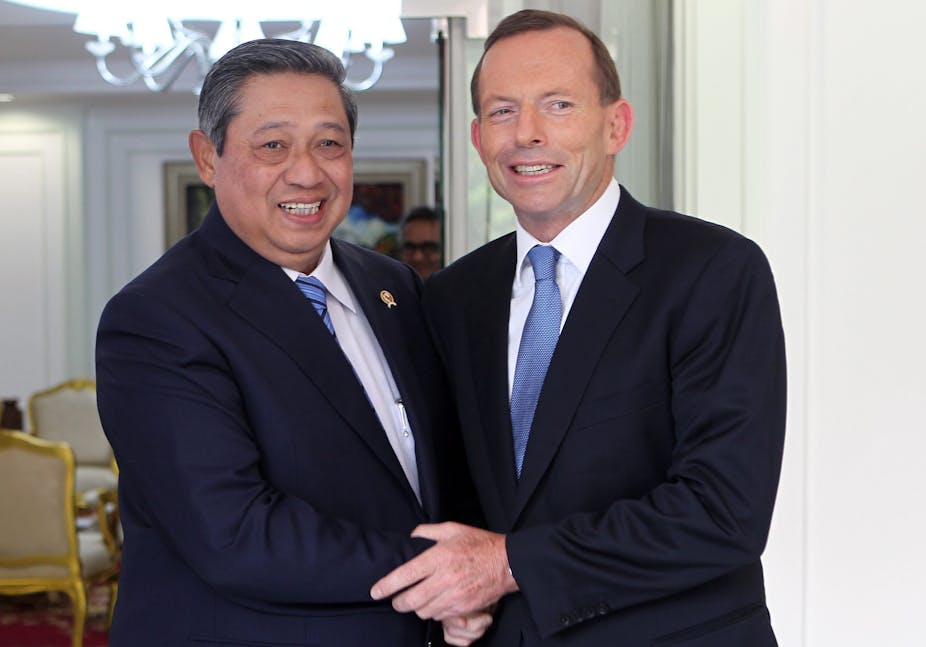Many foreign policy observers are apprehensive about the election of Tony Abbott. A key concern is that his government may be liberal in name only and that we may see a return to the sorts of policies that distinguished the Howard era. What such analyses miss, however, is that the ALP has actually adopted strikingly similar positions on many issues in the meantime. Any changes may be at the margins and primarily in the emphasis that is given to particular issues.
Policy toward asylum seekers is both the biggest test of the Abbott agenda and the area where there is likely to be a good deal of continuity. Because the ALP had effectively embraced much of the Howard government’s approach to this issue it may not be the game-changer many believe. True, if the Coalition really does start trying to turn the boats around, things could go rapidly wrong with all sorts of unpalatable consequences. But will they?
Indonesia will clearly not be impressed if Australia unilaterally tries to abdicate responsibility for what is an unambiguously international problem. More importantly, perhaps, neither will the Australian public — or the navy, for that matter. Fishing bodies out of the water — especially small ones — is not what sailors signed up for; it doesn’t look good on the nightly news either.
Turning back the boats is not a sustainable long-term strategy and probably won’t work anyway. Indeed, one safe prediction is that the supply of would-be asylum seekers is going to grow and it’s not obvious what to do about it. No one has figured out how to deal with a problem that widespread state failure and climate change are likely to make worse.
Unfortunately these issues may add to an underlying narrative of insecurity. And yet in Australia, at least, things really aren’t that bad. That is, after all, why so many are trying to get to what looks like a comparatively well-run oasis of sanity and stability. Is ramping up defence spending and reinforcing our traditional alliance relationships - as Abbott is promising - really the most imaginative way to respond to the new normal in international affairs?
Whether it is or not, that’s what we’re likely to get. Tony Abbott is notoriously sceptical about the significance of climate change, and many in his cabinet make much of their supposedly hard-headed pragmatism. But anyone who does take climate change seriously also recognises that it’s the quintessential collective action problem. In other words, if we’re actually going to do anything about it, we’re going to have to do it in ways that involve unprecedented levels of international cooperation.

If you’re an optimist, this could mark the beginning of a new era in human development, never mind conventional international politics. If you’re a pessimist, it may presage a fairly Darwinian struggle for survival in which the natural environment plays an increasingly prominent role. Either way, we shouldn’t expect to hear too much about long-term international strategies to tackle such issues from the incoming government.
And yet, despite the Coalition’s historic aversion to multilateral institutions, Australia really could do a bit of modest agenda-setting on the international stage. We are, after all, currently chairing the United Nations Security Council and will attract unaccustomed levels of attention as a consequence. The failings and shortcomings of the UN are too well known to need repetition. But however jaundiced your view, it’s worth asking one important question: what’s the alternative?
If the Coalition still thinks the UN is in need of reform, here’s its big chance to say how. Inadequate though the likes of the UN and the European Union may be, they represent the best hope for multilateralising common problems. Indeed, these kinds of forums not only offer at least some prospect of forging international agreement, they also potentially enhance the influence of so-called middle powers such as Australia. A key early test here will be Australia’s ability to assume an impartial policy at the UN as far as any possible intervention in Syria is concerned.
Tony Abbott’s decision to prioritise relations with our immediate neighbours and to make Indonesia his first overseas destination is welcome and to be applauded. Indonesia actually has the potential to have a more direct impact on our security than China does. It is also becoming a more significant international actor with which Australia ought to cooperate much more closely. There is potentially much to be gained by establishing ever deeper, institutionalised patterns of cooperation with our increasingly prominent neighbour.
However, it is not clear whether the apparent enthusiasm for closer regional relations marks a genuine recalibration of the coalition’s foreign policy agenda, or a way of defusing criticisms that have been made of its privileging of “traditional” ties. If there is one phrase Abbott really ought to avoid it is the so-called “Anglosphere” he has invoked in the past.
The idea that a handful of Western nations could or should play a distinctive role in international affairs always looked improbable. This was an anachronistic fantasy at the best of times, and one that was at odds with Australia’s geographical and historical realities. In the light of Britain’s overdue recognition of its limited international capabilities and the US’s misgivings about getting embroiled in yet another Middle Eastern quagmire, it looks rather preposterous.
Balancing what Abbott calls his “disposition” to support traditional allies with a recognition of Australia’s regional position and the realities of a rapidly evolving international order will define the new government’s foreign policy agenda. For better or worse, they could well surprise us.

